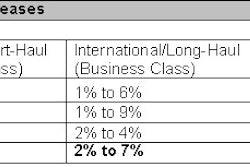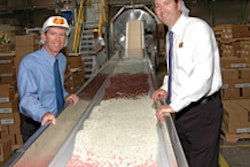Orlando — November 21, 2008 — IT and business executives are proactively working together to anticipate initiatives that should be carried out to minimize the overall impact of the economic downturn, according to a survey commissioned by the Society for Information Management and completed in June.
"The annual SIM survey provides important insights demonstrating that the overall state of IT remains very strong," said Jerry Luftman, SIM vice president for academic affairs and professor and associate dean at the Stevens Institute.
While the survey was taken before the recent financial developments, Luftman believes that the results overall are very positive for the IT industry.
"With all of the concern regarding our economy, it appears as though IT and business executives are working closely together to ensure they are well prepared," Luftman said. "Budget and headcount forecasts remained strong, despite the fact that economic conditions were weakening at the time the survey was taken."
Luftman says the SIM study confirms that business leaders continue to view IT as an important strategic partner and understand that it plays an important role in growing organizations, even in times of economic distress.
More than three-hundred respondents, primarily senior IT leaders within SIM's membership base, participated, representing data from nearly three-hundred companies. The results showed that:
Budgeting and staffing projections were only one part of the SIM study. Additional research results focus on the state of the CIO, business/technology alignment and career development issues.
According to respondents, the average CIO has held position for 4.3 years, up from 4.1 in 2007. Forty-five percent of respondents said their CIOs have been there for more than three years. Along with increasing tenure, the study confirms that CIOs are spending about 80 percent of their time on non-technical-related issues and play a larger role in business decisions.
The top five ways CIOs (both old and new) spend their time include:
The survey also provides positive indicators that organizations are continuing to align IT and business units and view IT as strategic assets — 43 percent of respondents report to the CEO and 28 percent report to the CFO.
Additionally, 22.2 percent of respondents say that their IT organizations are organized as federations, which is an improvement of 4.2 percent from 2007.
Further emphasizing the increase in alignment, organizations report that they are looking for potential employees who demonstrate management and interpersonal skills usually associated with success in business careers.
The top five skills for both entry- and mid-level professionals include, below, does not include any technical skills.
SIM announce the survey results last week at its SIMposium 08 conference in Orlando, Fla.
"The annual SIM survey provides important insights demonstrating that the overall state of IT remains very strong," said Jerry Luftman, SIM vice president for academic affairs and professor and associate dean at the Stevens Institute.
While the survey was taken before the recent financial developments, Luftman believes that the results overall are very positive for the IT industry.
"With all of the concern regarding our economy, it appears as though IT and business executives are working closely together to ensure they are well prepared," Luftman said. "Budget and headcount forecasts remained strong, despite the fact that economic conditions were weakening at the time the survey was taken."
Luftman says the SIM study confirms that business leaders continue to view IT as an important strategic partner and understand that it plays an important role in growing organizations, even in times of economic distress.
More than three-hundred respondents, primarily senior IT leaders within SIM's membership base, participated, representing data from nearly three-hundred companies. The results showed that:
- 44 percent projected that their 2009 budgets will increase from 2008
- 43 percent estimated they will have a greater headcount in 2009 compared to 2008
- 75 percent projected IT staff salaries will increase in 2009
- An average of 5.2 percent of IT budgets is anticipated to be spent on outsourcing (a 2 percent increase from 2008)
- 52.5 percent reported that their 2008 turnover rate was less than 5 percent.
Budgeting and staffing projections were only one part of the SIM study. Additional research results focus on the state of the CIO, business/technology alignment and career development issues.
According to respondents, the average CIO has held position for 4.3 years, up from 4.1 in 2007. Forty-five percent of respondents said their CIOs have been there for more than three years. Along with increasing tenure, the study confirms that CIOs are spending about 80 percent of their time on non-technical-related issues and play a larger role in business decisions.
The top five ways CIOs (both old and new) spend their time include:
- Relationship management with business
- Relationship management with IT staff
- Strategy
- IT Governance
- Operations (greater than 80 percent non-technical)
The survey also provides positive indicators that organizations are continuing to align IT and business units and view IT as strategic assets — 43 percent of respondents report to the CEO and 28 percent report to the CFO.
Additionally, 22.2 percent of respondents say that their IT organizations are organized as federations, which is an improvement of 4.2 percent from 2007.
Further emphasizing the increase in alignment, organizations report that they are looking for potential employees who demonstrate management and interpersonal skills usually associated with success in business careers.
The top five skills for both entry- and mid-level professionals include, below, does not include any technical skills.
- Ethics and morals
- Critical thinking/problem solving
- Collaboration; teams
- Problem solving
- Communication: oral
SIM announce the survey results last week at its SIMposium 08 conference in Orlando, Fla.



















